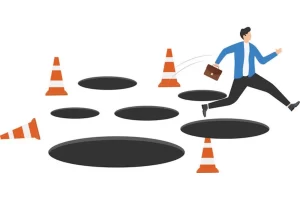With so many people putting in some much time, effort, and resources into making money online, you’d think there would be a lot more successes.
After all, the realm of online business has matured quite a bit: there’s a wide array of business models, with easily learned strategies, and proven effective tactics.
So why do so many fail? Why aren’t more of us successful, or more successful?
As someone with nearly two decades in the trenches, and regular exposure & interaction with hundreds of online business owners & operators, I’ve seen it all. But while I can still be surprised, as I consider the question, the phrase “nothing new under the sun” comes to mind.
In other words, I see people making the same mistakes today as I did when I began trying to make money online. It seems for every successful effort, there are 100 – or more! – entrepreneurs, new & old, failing to achieve their objectives.
With the growing number of options, markets, and approaches – e-commerce, affiliate marketing, blogging, etc. – the particulars of these ‘failures’ have multiplied, but when you get right down to it, these ‘wantrepreneurs’ are really getting hung up by falling into the same traps as their ‘old school’ compatriots.
In an effort to distill these common pitfalls down to a digestible list, I’ve compiled a list I call “The Seven Deadly Sins of Online Business”. And it’s right in line with the well-known “Pareto principle” that says that roughly 80% of the effects come from 20% of the causes, though it probably tips more towards 95-5 online: 95% of the reasons for failure can be boiled down to the same 5% of causes.
The solution…? This wouldn’t be much of a resource without a solution, right? Keep calm and keep reading, it’s just past the list of causes:
The Seven Deadly Sins of Online Business
#1: Inaction.
It shouldn’t need to be said, but I’ll say it anyway: nothing happens if nothing happens. Success doesn’t happen through osmosis – or wishful thinking.
Whatever the circumstance (and it’s worth pointing out that quitting too soon, before our efforts have had sufficient time, is just as deadly as not starting in the first place), or the reason (poor prioritization, feeling overwhelmed, fear of failure, feeling intimidated with the task(s) at hand), if days and then weeks continue to go by without some significant forward motion, then we’re dead in the water. If this is you, finding a way to overcome inaction is Job #1.
#2: Lack of focus.
Most commonly, I see this in the guise of “Next Shiny Object” or “the grass is always greener on the other side” syndrome – looking for or becoming distracted by a seemingly-better strategy, niche, course, idea, or tool.
While there may legitimately be ‘better things’ out there, if you find yourself hopping from one to the next on a regular basis, then you need to get yourself a set of blinders. Otherwise, at best, the distraction will ensure a mediocre outcome with whatever you’re doing. And “mediocre” today equates to “unsuccessful’.
#3 Procrastination.
I’ll write this one up later…
😉
#4: Wrong Niche or Market.
Choosing the wrong niche or market is one of the more common “sins”. For some, it’s picking a something that simply won’t work: not enough traffic/interest/revenue to be had, too competitive, or it requires a degree of familiarity or expertise that you don’t have. For others, it’s a mismatch between the chosen market and the business model used, such as trying to build a list or an eCommerce effort in a niche that doesn’t buy anything.
#5: Lack of Systems / Poor Optimization.
Are you optimizing your pages, your copy, your traffic-generating efforts? If not, then you are in essence betting that you have it all working well right out of the gate – and the chances of that being so are slim-to-none.
How about your conversion efforts, are they optimized? What about tracking – are you tracking your visitors’ behavior on your site, your site metrics, etc.? If not, you have no way to know how you’re doing, or what you should be addressing.
#6: “Short-Term-ism”.
Ok, I made that term up – in case it wasn’t apparent. What I’m referring to is the all-too-common “sin” of trading longevity & sustainability for a short-term payout.
To illustrate with an all-too-common scenario: the affiliate marketers who don’t build a list. Or rather, they don’t build their own list (you can be sure the vendor whose products you’re promoting is very happy to have you build his list).
Too much time or effort to do? The reality is unless you’re getting very large commissions and stellar conversions, you’re leaving money on the table and leaving yourself with nothing to show beyond an initial payout. Another recipe for ‘long term unsuccess’.
#7: Doing it wrong.
Far too often I see ‘online wantrepreneurs’ applying their best efforts to a strategy or tactic that won’t work, or not implementing a particular strategy or tactic properly.
How often, you ask? Often enough that I was able to build a private paid online forum and a separate live training membership for people trying to build a successful online business. It ran for three and a half years, and at it’s peak had over 3,200 members.
If they knew what to do, and were doing it right, they wouldn’t need someone to teach them how to become successful. (Not to toot my own horn, but we did help create quite a few successes, with over 1000 posts – not individual successes, posts – on our “Success Stories” board to prove it).
Even if everything else on this list is addressed, this “sin” can – and usually does – result in frustration, disappointment, and ultimately in failure.
The bottom line is this: online business, and the whole online environment, has matured, and must be treated like any other ‘real’ business. This means we have to be prepared to put in the necessary time and effort to learn what to do, how to do it correctly, to apply ourselves and what we learn, to continually evaluate our efforts, and to continually improve.
What To Do…?
If you’re anything like me – or virtually every other online marketer – you’re guilty of one or more of these ‘Seven Deadly Sins’.
So… what do you do about it?
Part of the answer is inherent in the question of ‘what to DO about it’: you DO it.
As I like to say, “you have to do the do, to get the get” (pretty sure I didn’t make that up, but unless you know who did, I’ll take credit for it lol). In other words, nothing else matters if you aren’t taking action. Doing something is better than doing nothing: at least you’ll have a chance of succeeding. If you do nothing, you’re guaranteed to get nothing.
Beyond simply taking action, many of these ailments can be cured by copying: finding something that already works and duplicating it – the “do what I do, and you’ll get what I get” school of business.
(This is what I did to create my own successes – I studied what was working, ‘reverse-engineered’ it to the greatest extent I could, and implemented it myself.)
If I had to summarize the ‘cure’, it would be this:
- Don’t stop doing – inaction and inertia are deadly.
- Whether it’s an entirely new effort or fixing/building on what you already have, find out what’s working and copy it.
- Never stop optimizing – if you’re not sure how to look it up.
- Take the long view – be the turtle, not the hare.
It’s easier to fail than it is to succeed, but it’s also almost certainly easier to succeed than you think!




